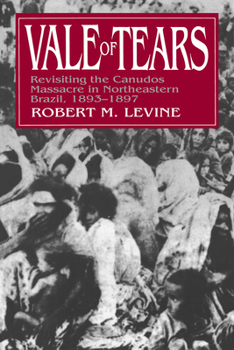Vale of Tears: Revisiting the Canudos Massacre in Northeastern Brazil, 1893-1897
Select Format
Select Condition 
Book Overview
The massacre of Canudos In 1897 is a pivotal episode in Brazilian social history. Looking at the event through the eyes of the inhabitants, Levine challenges traditional interpretations and gives weight to the fact that most of the Canudenses were of mixed-raced descent and were thus perceived as opponents to progress and civilization.
In 1897 Brazilian military forces destroyed the millenarian settlement of Canudos, murdering as many as 35,000 pious rural folk who had taken refuge in the remote northeast backlands of Brazil. Fictionalized in Mario Vargas Llosa's acclaimed novel, War at the End of the World, Canudos is a pivotal episode in Brazilian social history. When looked at through the eyes of the inhabitants of Canudos, however, this historical incident lends itself to a bold new interpretation which challenges the traditional polemics on the subject. While the Canudos movement has been consistently viewed either as a rebellion of crazed fanatics or as a model of proletarian resistance to oppression, Levine deftly demonstrates that it was, in fact, neither.
Vale of Tears probes the reasons for the Brazilian ambivalence toward its social history, giving much weight to the fact that most of the Canudenses were of mixed-race descent. They were perceived as opponents to progress and civilization and, by inference, to Brazil's attempts to "whiten" itself. As a result there are major insights to be found here into Brazilians' self-image over the past century.
In 1897 Brazilian military forces destroyed the millenarian settlement of Canudos, murdering as many as 35,000 pious rural folk who had taken refuge in the remote northeast backlands of Brazil. Fictionalized in Mario Vargas Llosa's acclaimed novel, War at the End of the World, Canudos is a pivotal episode in Brazilian social history. When looked at through the eyes of the inhabitants of Canudos, however, this historical incident lends itself to a bold new interpretation which challenges the traditional polemics on the subject. While the Canudos movement has been consistently viewed either as a rebellion of crazed fanatics or as a model of proletarian resistance to oppression, Levine deftly demonstrates that it was, in fact, neither.
Vale of Tears probes the reasons for the Brazilian ambivalence toward its social history, giving much weight to the fact that most of the Canudenses were of mixed-race descent. They were perceived as opponents to progress and civilization and, by inference, to Brazil's attempts to "whiten" itself. As a result there are major insights to be found here into Brazilians' self-image over the past century.
Format:Paperback
Language:English
ISBN:0520203437
ISBN13:9780520203433
Release Date:December 1995
Publisher:University of California Press
Length:365 Pages
Weight:1.10 lbs.
Dimensions:0.8" x 6.0" x 9.0"
Related Subjects
Americas Brazil Central America History Latin America Modern (16th-21st Centuries) South America WorldCustomer Reviews
2 ratings
Masterful book on religion in Brazil
Published by Thriftbooks.com User , 25 years ago
I read this book on recommmendation by a friend. Athough the language is sophisticated, the book makes Brazil in the 1890s come alive. It made me want to go out and read Da Cunha's work, too. This book is masterful and compelling, and the story it tells is tragic.
A superior combination of drama, insight & scholarship.
Published by Thriftbooks.com User , 26 years ago
Northeast Brazil has arguably inspired more fine writing than any other region in Latin America, & Levine's book continues this tradition. The Canudos episode has had two major previous chroniclers, first Da Cunha's classic eyewitness account "Rebellion in the Backlands," & Vargas Llosa's "War of the End of the World," familiar to US readers. Levine's scholarly history does not have the literary merit of its predecessors (though it's still quite readable). But it is analytically superior, because in documenting the historical background & religious orthodoxy of the Canudos community Levine reveals his subjects as well-rounded historical actors rather than incoherent fanatics. He thus restores the humanity of this tragic episode's victims, not least by showing how they exemplified millenarian patterns found elsewhere. The well-chosen illustrations make the book visually striking too. I would not hesitate to assign the paperback to advanced undergraduates. It is the definitive modern interpretation, & ultimately it will stimulate more research & revised perspectives. We cannot ask more of a good historian.





